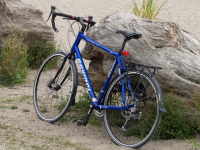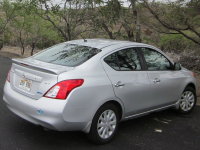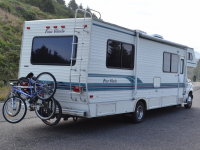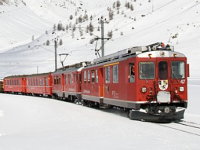Leçon 21 - Phrasal verbs

In this lesson you'll learn about phrasal verbs and how to use them in the English language. Many common English phrasal verbs are included.
You'll also learn some common English words related to transportation.
A small reading passage is included to help you improve you reading comprehension.
Annonce
Lire l’anglais
It’s 4:30 and Anna has finished work for the day. She leaves her office and walks into a warm, sunny day. The sky is blue with only a few small white clouds.
Anna walks along a large sidewalk on a busy city street. She stops at the intersection and waits for the light to turn green.
“Excuse me,” a lady with long black hair says, “Do you know where the Apollo theater is?”
Anna thinks for a moment, then says, “Walk up to the next block, then turn right. Keep going straight and you should see it after a few blocks.”
“Thank you,” the lady says.
The light turns green and Anna walks across the crosswalk along with a crowd of people. A few blocks later the stores give way to larger office buildings. She crosses a small bridge, then turns left and enters an industrial area with warehouses and small businesses.
After a few blocks the street ends at a large park. She turns left onto a path that goes into a wooded area, and eventually connects with a path that goes along the river. This part of the park is very busy with lots of cyclists and joggers on the path.
After about a kilometer, she turns right onto another path that leads out of the park and into a residential area with small houses and apartment buildings. She walks up three more blocks, turns left and she is at her apartment building.
She unlocks the door to the building and walks up a flight of stairs. She opens the door into a long hallway. She walks down the hall to the door of her apartment. She unlocks the door, walks into her apartment and sits down on her sofa, glad to be back home.
Vocabulaire anglais
| finish | finir |
| leave | partir |
| office | bureau |
| walk | marcher |
| day | jour |
| sunny | ensoleillé |
| cloud | nuage |
| sky | ciel |
| sidewalk | trottoir |
| city | ville |
| intersection | intersection |
| wait for | attendre |
| theater | théâtre |
| moment | moment |
| block | bloc |
| turn | tourner |
| sees | voir |
| crosswalk | passage pour piétons |
| crowd | foule |
| store | magasin |
| building | bâtiment |
| cross | traverser |
| bridge | pont |
| industrial area | zone industrielle |
| warehouse | entrepôt |
| business | entreprise |
| park | parc |
| wooded | boisé |
| connect | relier |
| river | rivière |
| jogger | joggeur, joggeuse |
| residential area | zone résidentielle |
| glad | content |
| hallway | couloir |
Vocabulaire anglais - Transportation
In this section you'll learn some English words related to transportation.

 road
road

 bridge
bridge
 train tracks
train tracks

 motorcycle
motorcycle

 bicycle, bike
bicycle, bike

 car
car
 bus
bus

 motorhome
motorhome

 train station
train station
 train
train

 tram
tram

 subway
subway

 freighter
freighter

 truck
truck

 plane, airplane
plane, airplane

 helicopter
helicopter

 airport
airport

 boat
boat

 sailboat
sailboat

 ferry
ferry
Grammaire - Phrasal Verbs
A phrasal verb is a compound verb made up of the following combinations:
- a verb and a preposition (pick on)
- a verb and an adverb (take off, give in)
- a verb and both an adverb and a preposition (put up with)
Verb + Adverb
Some of these phrasal verbs do not require an object.
- The birds came back.
- The dog went away.
- We sat down.
Some of these phrasal verbs require an object. For these phrasal verbs the object can usually be put after the verb or after the adverb. If the object is a pronoun, it must go between the verb and adverb.
- The children put their toys away.
- The children put away their toys.
Verb + Preposition
These phrasal verbs always have an object and the object follows the preposition. Sometimes there will be two objects. The object of the verb and the object of the preposition.
- He asked for a new drink.
- He asked the bartender for a new drink.
Verb + Adverb + Preposition
These phrasal verbs have both an adverb and a preposition. They require an object, which follows the entire phrasal verb.
- Look out for the street we need to turn at.
- I won't put up with it anymore.
Common Phrasal Verbs
Phrasal verbs are very common in English, especially in informal and spoken English. Many phrasal verbs are replaced by verbs of latin origin in more formal writing.
Phrasal verbs can be very complicated for people learning English, since the meaning of a phrasal verb cannot always be guessed by looking at the individual words. Because phrasal verbs are very common, they are very important to master for anyone who wants to be fluent in English.
here is a list of some common phrasal verbs with examples of how to use them in a sentence.
back down
reculer
- He refused to back down, even when he realized he was wrong.
be up to
être prêt à, être jusqu'à
- What are you up to? I'm just watching a movie.
break down
tomber en panne, décomposer
- My car broke down last night.
- The police broke down the door of their house.
carry on
continuer
- Carry on with what you're doing.
catch on
devenir populaire
- It took me a while to understand what you were saying, but I finally caught on.
- My shirt caught on the thorns.
- The song never caught on when it was first released, but now it's a classic.
catch up with
rattraper
- I'll catch up with you later.
- I can't leave yet, because I have too much work to catch up with.
come back
revenir
- I'll come back for them later.
fill in
remplir, combler
- Fill in the form then return it to me.
- I'll fill you in later.
get back
revenir
- What time will we get back?
- We'll get back before dinner.
get in
entrer
- What time did you get in?
- Get in the car.
get out of
sortir de
- He got out of the car and walked toward the house.
- How did you get out of doing your homework?
get over
surmonter, se remettre
- How can we get over the river.
- She just got over being sick.
get up
se lever
- What time did you get up?
- I had to get up early this morning?
- Get up from the couch. We have to go.
give away
donner, révéler
- He gave away his old clothes.
give back
redonner, rendre
- Tomorrow I'll give you back the books I borrowed.
give up
abandonner, quitter
- Don't give up!
- He gave up his seat for the injured passenger.
go away
s'en aller, partir
- Why won't you just go away.
- The bear finally went away.
go on
continuer
- I'll go on working until I'm finished.
- What's going on?
go out
sortir
- We're going out now.
- They're going out for dinner.
- The fire went out.
go up
monter
- The price of coffee keeps going up.
- Go up to the ticket booth and buy a ticket.
hold on
saisir, cesser
- Hold on tight!
- Hold on. We're almost there.
hold up
soutenir, lever
- Hold up the present so everyone can see it.
- What's the hold up. We're in a hurry.
- How's your leg holding up? It's sore, but I can still walk.
hurry up
se dépêcher
- Hurry up or we'll be late!
keep on
continuer à
- If you keep on studying, you'll pass the course.
keep out
rester en dehors
- The fence will keep out the bears.
leave out
omettre
- Don't leave out any details.
look after
soigner, veiller
- She is looking after her brother until her parents come home.
look away
regarder loin
- He only looked away for a moment, but he missed the goal.
look for
chercher
- What are you looking for?
- I'm looking for my keys.
look forward to
attendre avec impatience
- I look forward to meeting you.
- I'm looking forward to my vacation.
look out!
faire attention
- Look out! There's a car coming!
look out for
chercher
- Look out for the potholes in the road.
look up
rechercher
- The girl looked up when her mother called her.
- I had to look up her phone number before I could phone her.
- Things are looking up.
look up to
admirer
- She looks up to her older sister, and wants to be just like her.
make up
compenser, inventer
- You can't just make things up.
- He made up a terrible excuse.
- She made up a funny story.
pick up
ramasser
- Pick up the toys on the floor.
- I'll pick you up around seven.
pay back
rembourser
- When will you pay back the money I lent you?
put away
ranger, mettre de côté
- Put away the tools when you are done with them.
put off
repousser, retarder
- I can't put it off any longer.
- He was put off by the smell.
put on
mettre
- Don't forget to put on your jacket before you go outside.
- They put on a great show.
put out
éteindre
- Put out the fire before you go to bed.
put up with
supporter
- It's so loud here! How do you put up with all the noise?
set out
se mettre en route
- They set out on a three day hike.
set up
installer, instaurer
- I went to the bank to set up a new account.
- I spent this afternoon setting up my new computer.
stay up
rester debout
- I stayed up too late last night.
- The notice stayed up for three days.
- The statue stayed up even though it was hit by a car.
take after
prendre après, ressembler à
- He takes after his father. They both like to go hiking.
take down
retirer, désassembler
- She took down the sign.
- We took down the tent in the morning.
take off
enlever, décoller, partir
- Take off your shoes at the door.
- The plane is taking off.
- Sales of the new software are really taking off!
- I'm not going to work tomorrow. I'm taking the day off.
take on
accepter
- He took on too much work.
take up
commencer une nouvelle activité
- The furniture takes up too much room.
- Sarah took up swimming so she could improve her health.
turn out
arriver, se révéler
- It turned out to be easier than I thought it would be.
turn up
arriver, monter le volume, révéler
- Your keys will turn up somewhere.
- Turn up the music.
work out
résoudre, s'exercer
- We can work it out.
- We worked out for an hour at the gym.
Annonce
Flashcards
Voici quelques flashcards pour vous aider à apprendre quelques mots anglais liés au transport.
Practice
Écrivez entre 100 et 500 mots sur une activité ou un passe-temps favori.
Quiz
This quiz covers the material included in this lesson. Try the quiz as many times as you like. Once you have passed the quiz, continue to the next lesson.